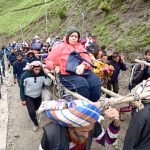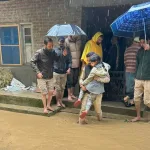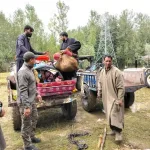The serene valleys and snow-capped mountains of Kashmir hide countless untold stories—some of beauty, others of pain. Among the most overlooked are the voices of the elderly population, whose silent suffering often goes unnoticed in the shadow of conflict, displacement, poverty, and social change. The elderly in Kashmir are grappling not just with the challenges of aging, but with a unique blend of historical trauma, loneliness, economic hardship, and the erosion of traditional family structures.
Traditionally, Kashmiri society has been deeply rooted in cultural and familial values that emphasize respect and care for elders. Grandparents were once central figures in the household, revered for their wisdom and experience. But times are changing. The once-strong joint family system is gradually disintegrating due to urbanization, migration, conflict, and changing social norms. Many elderly individuals now find themselves isolated, neglected, and emotionally abandoned in their twilight years.
Some are left alone in their ancestral homes as their children move to other parts of the country or abroad in search of better livelihoods. Others live with family but are treated as burdens, their presence more of an obligation than a source of joy or respect.
Years of conflict in Kashmir have left deep emotional scars. Many elderly people have lived through multiple violent phases—from the tribal invasion of 1947, the wars of 1965 and 1971, to the terrorism that erupted in the 1990s and the prolonged instability that followed. These traumatic experiences, coupled with the loss of loved ones have created a population of grieving parents and grandparents.
The psychological toll is immense. Many elders suffer from depression, anxiety, and post-traumatic stress, often without any diagnosis or support. In a region where mental health care is still stigmatized and underdeveloped, their emotional agony remains invisible. They often lack the language or opportunity to express their pain, and the cultural expectation of stoicism in old age adds to their silence.
Healthcare for the elderly is another major concern. Access to quality geriatric care is limited in Kashmir, especially in rural areas. The elderly often suffer from chronic conditions such as arthritis, hypertension, diabetes, and cardiovascular diseases, but regular treatment is rare. Hospitals are overburdened, understaffed, and lack the specialized services that older patients require.
Transportation to healthcare facilities is also a challenge. In remote villages, elderly individuals might have to travel several kilometers on foot or depend on irregular transport services to reach a clinic or hospital. In winter, heavy snowfall can cut off entire regions, making medical access nearly impossible.
Those who rely on government pensions face delays or bureaucratic hurdles. For many, the monthly pension is insufficient to cover even basic medication. The inability to afford proper medical care adds to their physical suffering and sense of helplessness.
Most elderly people in Kashmir are not financially independent. Traditionally, the family provided economic security in old age. However, with rising unemployment, inflation, and shifting responsibilities, younger generations are often unable—or unwilling—to support their aging parents.
Widowed elderly women are particularly vulnerable. Many lack property rights, savings, or any source of income, and end up living in dependency or destitution. With few old age homes and social welfare programs tailored specifically for the elderly in Kashmir, their economic struggles remain dire.
Some senior citizens who were once skilled artisans or farmers can no longer work due to declining health. Their contributions to society are forgotten, and they are left with no safety net. While central government schemes like the Indira Gandhi National Old Age Pension Scheme exist, awareness and proper implementation are lacking at the grassroots level.
Loneliness is a silent killer. As young people migrate for education or employment, the social fabric of Kashmir is undergoing a shift. Many old-age parents live alone, their houses once filled with laughter now echoing only with silence.
Festivals, weddings, and community events that once provided opportunities for elders to socialize have become fewer due to ongoing political tensions and a general atmosphere of fear. The internet and digital technologies have connected the world, but most elderly individuals are digitally illiterate, widening the communication gap with their children and grandchildren living afar.
The Covid-19 pandemic further intensified this isolation. Lockdowns and social distancing measures meant that many elderly individuals were completely cut off from human interaction for extended periods. Even those living with family experienced neglect and indifference, their needs overshadowed by the global crisis.
Kashmir’s older generation has witnessed immense cultural change. The traditions they once cherished are fading. Languages like Kashmiri and Shina are being replaced by Urdu and English among the youth. Local customs, folk tales, and oral histories that elders used to pass down are no longer considered relevant or interesting.
Many feel culturally displaced in their own homeland. This loss of identity is more than nostalgia—it’s a deep emotional wound. They fear dying without anyone remembering their stories or valuing their wisdom.
For Kashmiri Pandit elders, the sense of displacement is even more literal. Having been forced to flee the Valley in the 1990s due to terrorism, many now live in cramped migrant camps or distant cities, longing for a return that seems increasingly impossible. Their pain is compounded by the feeling of betrayal by both time and state.
Elderly women in Kashmir often bear a double burden—of age and of patriarchy. Many have lived lives of sacrifice, having taken care of families, farms, and businesses in times of turmoil. But in old age, they are frequently sidelined, with limited access to healthcare, property rights, or even decision-making within their households.
Widows face social stigma, especially if they are childless. Without male support, their vulnerability increases. In conservative communities, they are often restricted in movement and excluded from public life. This gendered neglect needs specific interventions, such as community support groups, legal literacy programs, and inclusive pension schemes.
The agony of the elderly in Kashmir is not inevitable—it is the result of systemic neglect, and cultural shifts. Change is possible, but it requires collective will.
The aged citizens of Kashmir are the living memory of the region—keepers of its traditions, witnesses to its tragedies, and silent sufferers of its unresolved conflicts. Their agony is not just personal; it is a reflection of how society treats its most vulnerable. In honouring and caring for the elderly, Kashmir has the opportunity to reclaim part of its lost compassion and humanity.
(Author is a Research Scholar and can be reached at: [email protected])








